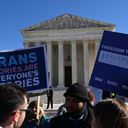Supreme Court's TikTok dance: Justices to weigh in on ban, with Trump opposed
President-elect Trump's highly unusual intervention in the Supreme Court's TikTok case reads almost like a guy asking for a favor from an institution that still runs on formality.
The big picture: Trump's last-minute effort to give TikTok a stay of execution is one more twist in a case that already scrambles every ideological dividing line.
Driving the news: The court is set to hear oral arguments Friday over TikTok's future. A new, overwhelmingly bipartisan law requires the app's Chinese parent company, ByteDance, to either sell TikTok by Jan. 19 or shut it down within the U.S.
- There's no simple partisan division on this one. Republicans in Congress supported the law, which President Biden signed, and GOP attorneys general have weighed in to help Biden defend the law in court.
- Trump previously advocated for a ban, then flip-flopped. He filed an amicus brief on Dec. 27 urging the court to pause the law.
- The actual parties in the TikTok case largely ignored Trump's filing, which is mostly about Trump, not the law.
- Whether the justices give it more credence could say a lot about the overall direction of a conservative court that has handed Trump some enormous victories.
What they're saying: ByteDance and a group of TikTok users argue that the law violates the First Amendment, because it would shutter one of the country's most popular platforms for personal expression.
- The Biden administration says the ban is rooted in national security concerns, and doesn't target any specific speech on TikTok. A new owner could still allow all the same content, it argues, so there's no First Amendment issue.
Between the lines: The conservative Supreme Court usually (but not always) sides with people making First Amendment claims. And it usually (but not always) sides with the federal government when the government says there's a national-security issue.
- In this case, it won't be able to do both.
And then there's Trump. He has asked the justices not to let the law go into effect as scheduled on Jan. 19 — but his argument is not rooted in any of the First Amendment or national-security concerns at issue in the case. It takes no position on those issues.
- "President Trump alone possesses the consummate dealmaking expertise, the electoral mandate, and the political will to negotiate a resolution to save the platform while addressing the national security concerns expressed by the Government," his brief says.
- The argument is essentially that the court should ignore the deadline Congress and the president decided on, and defer instead to Trump's force of personality.
- "President Trump is one of the most powerful, prolific, and influential users of social media in history. Consistent with his commanding presence in this area, President Trump currently has 14.7 million followers on TikTok," his brief says, arguing that he is uniquely well positioned to solve a social-media problem.
That may be a stretch, even for a court that has sided with Trump on any number of high-stakes issues.
- He is, for now, still just an ordinary citizen with no formal role in this dispute, and there is a statutory deadline that was intentionally set before the next president would be sworn in.
- But it's also a hard case, legally and politically, and any avenue that lets the justices avoid striking down a bipartisan law or banning a wildly popular app might have some appeal.





